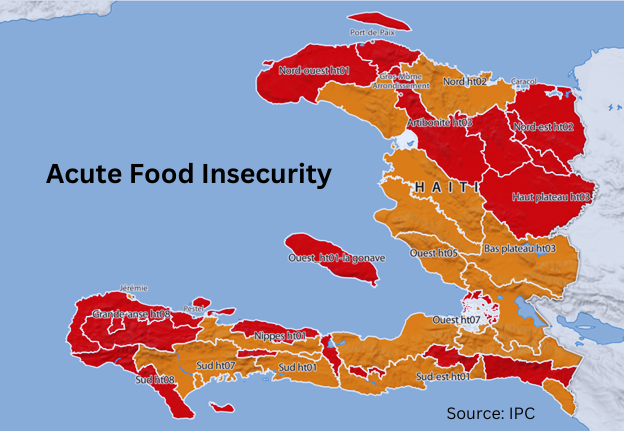“We never give up on our patients. We are proud of our mission, which is to serve the most vulnerable.”
Your donation can help Dr. Clermont and our entire staff care for more patients than ever before.


Integrated Food Security Phase Classification, ipcinfo.org
Haiti is still mired in the humanitarian crisis that escalated significantly in September. St. Boniface Hospital has remained open, 24/7, throughout this complex and difficult period, thanks to our dedicated staff and supporters.
Despite the challenges, our clinicians continue to care for every patient and our operations and supply chain teams are finding innovative ways to move critical supplies to the hospital and minimize stock-outs.
While there are many complex factors contributing to the crisis, one major component was gang violence blocking a key fuel terminal in Port-au-Prince. This situation caused extreme fuel shortages that affected supply chains, the operation of critical institutions, and even the availability of drinking water. Ubiquitous roadblocks have made travel impossible for days and weeks at a time.
The crisis has also halted economic activities and exacerbated skyrocketing inflation. According to FAO, the UN’s Food and Agriculture Association, food prices rose 63% in the last year, putting the basic food basket out of reach for many Haitians. 4.7 million people – almost half of the population – are experiencing high levels of acute food insecurity, including for the first time ever 19,200 in IPC’s “catastrophe” classification, at risk of starvation. While the port and fuel terminal were recently unblocked, significant challenges around fuel shortages, supply chains, safe travel, access to health care, availability of safe food and water, and other difficulties persist.
Additionally, on October 2, Haiti recorded its first confirmed cholera cases in three years. Initial cases were identified in areas of metropolitan Port-au-Prince isolated by gang activity and lacking access to clean water. By November 15, Haiti had over 9,000 suspected cases of cholera, spread across every geographic department of the country. Nearly 40% of these cases are children under 15 years of age.
Our community health team immediately launched an outreach campaign to educate the population in our area about cholera and cholera prevention through community meetings, review of handwashing practices in schools, and home visits. SBH also re-trained staff and set up a dedicated cholera treatment facility with strong infection control procedures. We were ready to receive and treat our first suspected cholera patients during the week of November 7.
This two-pronged approach, of both treatment and prevention, was key to successfully combating earlier waves of the disease. Together with our experience managing outbreaks and the hard work of our dedicated staff, we are confident in our ability to lead the cholera response for the region and keep our communities safe.
The current humanitarian crisis is presenting unprecedented challenges for everyone who lives and works in Haiti. As these crises force other hospitals throughout the country to close, it is critical that care at St. Boniface Hospital remains a constant, no matter what.
To learn more, watch our virtual update on YouTube: Upholding Care Amid Countrywide Crisis.
Your donation can help Dr. Clermont and our entire staff care for more patients than ever before.
